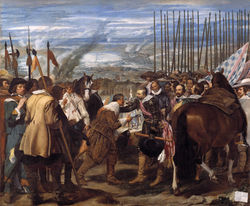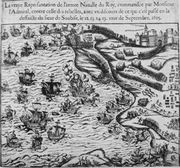1625
| Millennium: | 2nd millennium |
|---|---|
| Centuries: | 16th century – 17th century – 18th century |
| Decades: | 1590s 1600s 1610s – 1620s – 1630s 1640s 1650s |
| Years: | 1622 1623 1624 – 1625 – 1626 1627 1628 |
| 1625 in topic: |
| Subjects: Archaeology – Architecture – |
| Art – Literature – Music – Science |
| Leaders: State leaders – Colonial governors |
| Category: Establishments – Disestablishments |
| Births – Deaths – Works |
Year 1625 (MDCXXV) was a common year starting on Wednesday (link will display the full calendar) of the Gregorian calendar (or a common year starting on Saturday of the 10-day slower Julian calendar).
Contents |
Events of 1625
January–June

The surrender of Breda to Spanish troops
- January 17 – Led by the Duke of Soubise, the Huguenots launch a second rebellion against king Louis XIII with a surprise naval assault on a French fleet being prepared in Blavet.
- February – Huguenot forces under the Duke of Soubise capture the Island of Ré.
- March 27 – Charles Stuart (Charles I of England, Scotland and Ireland) succeeds James I of England.
- April 4 – Frederick Henry of Nassau marries Amalia, Countess von Solms-Braunfels.
- April 7 – Albrecht von Wallenstein is appointed German supreme commander.
- April 23 – Stadtholder Maurice of Nassau of the Dutch Republic dies and is succeeded by his younger brother, Frederick Henry.
- May 1 – A Portuguese-Spanish expedition recaptures Salvador, Bahia (Bahia) from the Dutch.
- May 15/16 – Rebellious farmers are hanged in Vocklamarkt, Upper Austria.
- June 2 – Prince Frederick Henry is sworn in as the stadtholder of Holland and Zealand.
- June 5 – Eighty Years' War: Spanish troops under Spinola conquer Breda after a year long siege.
- June 13 – King Charles I of England marries Henrietta Maria, Princess of France and Navarre.
- June 18 – The English Parliament refuses to vote Charles I the right to collect customs duties for his entire reign, restricting him to one year instead.
July–December

Naval action between the Huguenot fleet and the French Royal fleet, aided by English and Dutch ships, during the Capture of Ré island.
- July – First attack from barbary pirates in south-western England.[1]
- August 6 – Ernest Casimir of Nassau-Dietz is appointed as stadtholder of Groningen.
- August 16 – Ernest Casimir of Nassau-Dietz is appointed stadtholder of Drenthe.
- September 13 – A total of 16 rabbis (including Isaiah Horowitz) are imprisoned in Jerusalem.
- September 15 – After several skirmishes in the preceding days, troops under the Marquis of Toiras succesfully recapture the island of Ré, forcing the Duke of Soubise to flee to England and ending the second Huguenot rebellion.
- September 24 – A Dutch fleet attacks San Juan, Puerto Rico.
- October 8 – Admiral George Villiers' fleet sails from Plymouth, England to Cadiz.
- October 25 – A Dutch fleet attacks the Portuguese garrison at Elmina castle at present-day Elmina, Ghana, but is defeated with heavy casualties. This defeat, along with the defeats at Bahia and Puerto Rico caused a 5 year long lull in Dutch attacks on Spanish and Portuguese colonies.
- November 1-7 – George Villiers' fleet is defeated at Cadiz by the Spanish.
- December 9 – Thirty Years' War: The Netherlands and England sign the Treaty of The Hague, a military peace treaty for providing economical aid to king Christian IV of Denmark during his military campaigns in Germany.
Undated
- William Oughtred invents the slide rule.
- James Ussher becomes Archbishop of Armagh.
- The Dutch settle Manhattan, founding the town of New Amsterdam. The town would transform into a piece of what is now New York City.[1]
- The First Savoine War is fought between the Republic of Genoa and the Duchy of Savoy.
- The Bohemian Revolt ends.
- Danish intervention starts.
- A Huguenot revolt is suppressed.
Births
| Gregorian calendar | 1625 MDCXXV |
| Ab urbe condita | 2378 |
| Armenian calendar | 1074 ԹՎ ՌՀԴ |
| Bahá'í calendar | -219 – -218 |
| Bengali calendar | 1032 |
| Berber calendar | 2575 |
| Buddhist calendar | 2169 |
| Burmese calendar | 987 |
| Byzantine calendar | 7133 – 7134 |
| Chinese calendar | 甲子年十一月廿三日 (4261/4321-11-23) — to —
乙丑年十二月初三日(4262/4322-12-3) |
| Coptic calendar | 1341 – 1342 |
| Ethiopian calendar | 1617 – 1618 |
| Hebrew calendar | 5385 – 5386 |
| Hindu calendars | |
| - Bikram Samwat | 1681 – 1682 |
| - Shaka Samvat | 1547 – 1548 |
| - Kali Yuga | 4726 – 4727 |
| Holocene calendar | 11625 |
| Iranian calendar | 1003 – 1004 |
| Islamic calendar | 1034 – 1035 |
| Japanese calendar | Kan'ei 2 (寛永2年) |
| Korean calendar | 3958 |
| Thai solar calendar | 2168 |
- June 8 – Giovanni Domenico Cassini, Italian astronomer and engineer (d. 1712)
- July 10 – Jean Herauld Gourville, French adventurer (d. 1703)
- August 13 – Rasmus Bartholin, Danish physician and scientist (d. 1698)
- August 14 – François de Harlay de Champvallon, Archbishop of Paris (d. 1695)
- August 20 – Thomas Corneille, French dramatist (d. 1709)
- September 24 – Johan de Witt, Dutch politician (d. 1672)
- October 4 – Jacqueline Pascal, French child prodigy and sister of Blaise Pascal (d. 1661)
- November 30 – Jean Domat, French jurist (d. 1696)
- December 14 – Barthélemy d'Herbelot de Molainville, French orientalist (d. 1695)
Deaths
- January 7 – Ruggiero Giovannelli, Italian composer
- March 7 – Johann Bayer, German astronomer (b. 1572)
- March 25 – Giambattista Marini, Italian poet (b. 1569)
- March 27 – King James I of England and Ireland/James VI of Scotland (b. 1566)
- March 29 – Antonio de Herrera y Tordesillas, Spanish historian (b. 1549)
- April 23 – Maurice of Nassau, Prince of Orange (b. 1567)
- April 27 – Mori Terumoto, Japanese warrior (b. 1553)
- June 1 – Honoré d'Urfé, French writer (b. 1568)
- June 5 – Orlando Gibbons, English composer and organist (b. 1583)
- August – John Fletcher, English writer (b. 1579)
- September 20 – Heinrich Meibom, German historian and poet (b. 1555)
- September 26 – Thomas Dempster, Scottish historian (b. 1579)
- October 22 – Kikkawa Hiroie, Japanese politician (b. 1561)
- December 9 – Ubbo Emmius, Dutch historian and geographer (b. 1547)
- date unknown
References
- ↑ Giles Milton (2005). White Gold. Hodder & Stoughton.